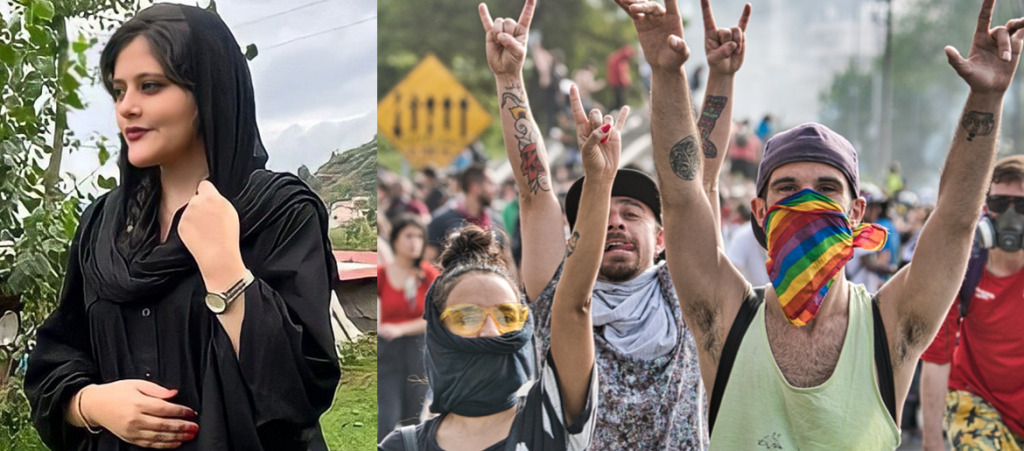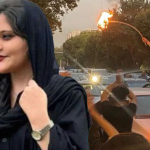
From our position of relative privilege in Australia, it can be very difficult to watch tragedy and conflict unfold overseas and feel helpless. When people fighting against oppression or suffering in the wake of a natural disaster need help, there are surprisingly few things the Australian government can do. As individuals, we’re often asked to help by paying attention – protestors fighting against an oppressive regime in Iran have been asking people around the world to keep sharing and talking about what’s going on. We understand if you have some skepticism around that. Can sharing articles, infographics or videos online actually help?
The answer is yes. When it comes to abuses of power, corrupt or oppressive leaders would prefer to conduct atrocities unnoticed. Turning the eyes of the world, including yours, to what is happening makes it much more likely that they will face consequences. When the Internet and social platforms are blocked (or in the case of natural disasters, destroyed) the people rely on the rest of the world to share their stories, making noise on their behalf. Attention builds pressure, and this strategy has proved successful in the past. It might feel insignificant, but things like sharing something on social media or turning up to a local solidarity protests contributes to keeping the spotlight on these issues until (hopefully!) there is a breakthrough.
To prove it here are three examples of global support for protests helping secure wins, big and small.
Iran Downgrades Death Penalty of Protestors, 2022
The Background: In November 2019, Iranian authorities detained three men for participating in protests against the government’s fuel price hikes: Amir-Hossein Moradi, Saeed Tamjidi and Mohammad Rajabi. They were put on trial as “riot leaders acting against the Islamic Republic” and were sentenced to death by judge Abol-Qasem Salavati. Judge Salavati is known as the “hanging judge” among Iranian activists, and was sanctioned by the U.S. and European Union for alleged human rights violations and conducting unfair trials.
After learning of the sentencing and that Moradi, Tamjidi and Rajabi were reportedly tortured into forced confessions, a protests exploded on social media begging the court to drop the death penalty under the Persian hashtag #do_not_execute. Foreign actors, sport stars and even former President Trump called for the executions to be stopped.
The Result: Due to the global pressure, the courts ordered a retrial and in September 2022 Moradi, Tamjidi and Rajabi were handed five-year jail sentences, officially reversing their death penalties. Babak Paknia, the lawyer representing them, announced the verdict on Twitter, adding that the jail sentences can also be appealed: “The time they have already served will effectively make them qualified for conditional release.”
@elica.lebon You’ve all been amazing beyond words, but we have work to do and we must act fast. #letelhamgo #letzahrago #letshervingo #freeiran #iran #iraniantiktok #iraniantiktok🇮🇷 #helpiran #iranianlivesmatter #iranianwomen #iranianwomenlivesmatter #iranianwomen #mahsaamini #justiceformahsaamini #lgb #lgbtq #lgbt🌈 #gaylivesmatter #gaylivesmatter🌈 #bilivesmatter #queerlivesmattter #lgbtqi #lgbtqally #womensrights #womensrightsmatter #womensrightsarehumanrights #humanrights #deathpenalty #abolition #deathrow #execution #criminalinjustice #iraniangovernment ♬ original sound – Elica Le Bon
Chile’s Estallido Social (Social Outburst), 2019 – 2021
The Background: An increase to the public transport fares in Santiago in October 2019 sparked local protests that quickly spread across the country, calling out the corruption and cost of living crisis that had caused deep inequality throughout Chile. More than one million people walked in “the biggest march in Chile” on 25 October. Chileans demanded the resignation of President Sebastián Piñera (a billionaire) and for a new constitution to replace the existing one, which was written while the country was a military dictatorship. Demonstrations, riots and unrest continued for months, until the COVID-19 pandemic in 2020 reduced the number of people in the streets.
From the get-go, President Piñera declared a State of Emergency, allowing Chilean authorities to use force against protestors. Around 30 deaths have been confirmed, with thousands injured and reports of police torturing and sexual assaulting protestors, the worst civil unrest since the end of the Pinochet dictatorship in 1990.
As this social movement was started and driven mostly by young people, social media was an important tool. Slang, satirical content, memes and the hashtag #ChileDespertó (Chile woke up) helped the sentiment behind the protests spread quickly, and share the truth of what was unfolding on the ground. It was extensively covered by international media, including profiles of protestors in the Guardian and solidarity marches around the world.
The Result: In October 2019, in an attempt to placate protestors President Piñera dissolved and reshuffled his government cabinet. In November 2019, Chile’s National Congress approved a motion to hold national referendum on whether to rewrite the constitution – this took place in October 2020, with 75% of voters in favour of a new constitution.
Although he did not resign, Piñera’s term ended in 2021 and the momentum from the social movement saw leftist Gabriel Boric elected as the new President. President Boric set up reparation funds for people who were injured or suffered human rights violations during the protests, and also oversaw the drafting of the new constitution (which the public ultimately voted against in 2022).
Ukraine’s Orange Revolution, 2004
The Background: Ukraine’s 2004 Presidential election was between two main candidates: Viktor Yanukovych, who was the Prime Minister at the time, backed by the government and Russia; and challenger Viktor Yushchenko, part of a multi-party alliance who wanted to introduce democratic reforms (and had previously been Prime Minister from 1999 to 2001).
After the second round of vote counting, Yanukovych was declared the winner by a slim margin, despite exit polls indicating that Yushchenkoh should have had a much larger win. With reports from domestic and and foreign election monitors indicated the result had been rigged, hundreds of thousands of people flooded Kiev’s main square in protest wearing orange – Yushchenko’s campaign colour. International support for the protestors (although this was more through media coverage rather than online) and Ukraine’s attempts to move towards a more Western, pluralistic democracy was crucial, with leaders from the European Union even going in to mediate the issue.
The Result: Demonstrations continued for 12 days through sleet and snow until the results of the original run-off were annulled and a revote was ordered by Ukraine’s Supreme Court. Under intense scrutiny by domestic and international observers, including Russia, the second count was declared to be “free and fair”. As expected, the result saw Yushchenko as the clear winner and he was installed as Ukraine’s President.




Comments are closed.